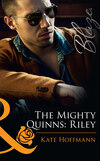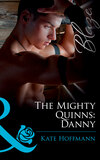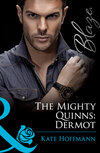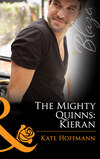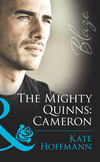Loe raamatut: «The Mighty Quinns: Ronan»

Praise for Kate Hoffmann from RT Book Reviews …
“Hoffmann’s deeply felt, emotional story is riveting.
It’s impossible to put down.”
— on The Charmer
“Fully developed characters and perfect pacing make this story feel completely right.”
— on Your Bed or Mine?
“Sexy and wildly romantic.”
— on Doing Ireland!
“A very hot story mixes with great characters to make every page a delight.”
— on The Mighty Quinns: Ian
“Romantic, sexy and heartwarming.”
— on Who Needs Mistletoe?
“Sexy, heartwarming and romantic … a story to settle down with and enjoy—and then re-read.”
— on The Mighty Quinns: Teague
Dear Reader,
I can’t believe another Quinn saga is coming to an end. The Mighty Quinns: Ronan is the fourth and final book about the Seattle branch of the Quinn family and marks my eighteenth Quinn book.
Will I be writing more? Of course! I’ve already begun planning for the next set of Quinns. I’m going to switch things up a bit and there will definitely be some surprises along the way. But you’ll recognize those sexy Irish boys you’ve all come to love. Watch for them coming soon. (Like many Irish families, sometimes you have to split people up to keep some sort of control.):)
Happy reading!
Kate Hoffmann
About the Author
KATE HOFFMANN has written more than seventy books for Mills & Boon. She spent time as a music teacher, a retail assistant buyer and an advertising exec before she settled into a career as a full-time writer. She continues to pursue her interests in music, theatre and musical theatre, working with local schools in various productions. She lives in south-eastern Wisconsin with her cat, Chloe.
The Mighty Quinns: Ronan
Kate Hoffmann

MILLS & BOON
Before you start reading, why not sign up?
Thank you for downloading this Mills & Boon book. If you want to hear about exclusive discounts, special offers and competitions, sign up to our email newsletter today!
Or simply visit
Mills & Boon emails are completely free to receive and you can unsubscribe at any time via the link in any email we send you.
To Brenda, my friend and my editor and my own best critic.
These Quinns are for you!
Prologue
THE CLOSET WAS dark and quiet. Ronan Quinn clutched the flashlight in his hand, the failing batteries providing a weak shaft of light. Closing his eyes, he tried to banish the disturbing images from his thoughts.
The dreams had started just a few months ago, right after his eighth birthday party. It had been the first party his family had attempted since his parents had disappeared the previous year.
Of course, it hadn’t been the same. Birthday parties were what his mother did best. She could turn an ordinary day into the most wonderful, magical event of a person’s life. For his seventh birthday, she’d taken him and his whole Cub Scout troop to the aquarium. They’d seen the most amazing thing. There’d been octopus cupcakes with long, licorice tentacles. And games like “Pin The Fin” on the shark. There had even been a fish shaped piñata filled with gum and jawbreakers and all his favorite candy.
At the end of the day, after the party was over and he was exhausted from the excitement, he’d received his gift, a beautiful aquarium, placed on a stand right next to his bed. He remembered how he’d stayed up all night, just watching the fish swimming back and forth in the blue light.
The aquarium was empty now, all the fish dead and the water drained. It was one of those things that had been forgotten once their world had been turned upside down. There was never any time to shop for fish. No one wanted to bother keeping the aquarium clean.
This year, his grandfather and older brothers had planned a party on the family sailboat, gathering ten of Ronan’s classmates for a sail on the sound. But when they’d gotten to the dock, Ronan had refused to get on the boat.
Fear had welled up inside of him as he stared at the dark water slapping against the hull. His stomach had begun to roil and his hands had grown ice cold. Ronan knew that if he got on the boat, the sea would swallow him up and pull him down to the very bottom where he would drown.
Dermot had stayed with him on the dock while the rest of the party left. And though his older brother tried to reassure him that everything would be fine, Ronan had seen the looks on his friends’ faces. He’d already been marked as being different since his parents’ disappearance. Now, he’d be completely alone, the subject of whispers and pity.
Ronan looked down at the book clutched in his arms. The huge picture book of ocean fish had been another gift from his mother. But this one had appeared next to his breakfast one morning. It hadn’t been his birthday or Christmas or any type of holiday at all. She’d just decided that he needed the book.
He turned the flashlight onto the pages and stared at the pretty pictures. But when he flipped the page to the chapter on sharks, Ronan slammed the book closed and hugged his knees to his chest.
There were always sharks in his nightmares. Sharks circling in the dark water. He tried not to think about what might have happened to his parents, but the nightmares brought it up again and again.
He’d asked questions that his grandfather and brothers refused to answer. How long could they live in the water? How far could they swim? If they were in the life raft, wouldn’t they drift to land? But there were never any explanations. He’d just been told to accept the fact that his mother and father were gone.
But he didn’t want to accept it. There was always a chance that they’d be found. Maybe on an island. Or maybe the boat was just floating around in the ocean, the sails torn or lost. Why couldn’t anyone see that?
“Ronan?”
His breath caught in his throat and he watched the door, shadows playing with the shaft of light. A few seconds later, the door swung open. His oldest brother, Cameron, stood in front of him.
“What are you doing in here?”
“Nothing,” Ronan said.
“You got a book. Are you reading?”
Ronan shook his head.
“Come on,” Cameron said. “You need to get back to bed.”
“I can’t,” Ronan said. “I’ll have bad dreams again.”
Cameron squatted down and rubbed Ronan’s knee. “You’re having nightmares?”
Ronan nodded. “Bad ones. With sharks. And Mom and Dad are swimming and trying to get away. But the water is dark and they can’t see anything.” Cameron held out his hands and Ronan crawled into his embrace. “I don’t want to go to sleep.”
“How about you sleep in my bed tonight,” Cameron said.
“Okay,” Ronan said, a flood of relief washing over him. Cameron would be able to protect him from the bad dreams. His older brother could do anything.
“You want to bring your book?” Cam asked. He handed it to Ronan. “Your fish book. You really like this book, don’t you?”
“Mom gave it to me,” Ronan said.
“You like fish? Maybe we could go fishing sometime.”
Ronan frowned. He never wanted to go near the ocean again. “I don’t like fish that way,” he said. “I don’t want to go near the black water. It might suck me up and pull me down to the bottom.”
“You don’t have to be scared of that,” Cam said.
But that was one point that Ronan refused to give to his older brother. He was never, ever going to go on the ocean again. “I like my aquarium fish,” Ronan ventured.
“You don’t have any aquarium fish,” Cameron said.
“I know. But I used to like them. They helped me sleep.”
“Well, maybe we could ask Grandda if we could go get you some new fish. Would that make you feel better?”
In truth, the only thing that could make Ronan feel better was if his mother was there to tuck him in and his father was there to kiss him goodnight.
Maybe his older brothers could do without that. Cameron was twelve and the twins, Kieran and Dermot were nine, almost ten. Maybe when you got older, hugs and kisses weren’t important. But it wasn’t a baby thing, was it, to want hugs and kisses?
Ronan reached out and grabbed his brother’s hand as they walked out of Ronan’s room and into the hall. He needed to be braver. That’s what older boys were expected to do. It was time to grow up.
1
THE SUN ROSE as the bus rolled across the state line from New Hampshire into Maine. After four days on the road, crossing the country accompanied by complete strangers, eating at roadside diners and truck stops and sleeping in fits and starts, Ronan was ready to reach his destination.
The sunrise had become an important event for him, something he looked forward to when there was little else to mark the passing time. But now that they’d reached the Atlantic coast, he saw a completely different sunrise, a blaze of color over the blue ocean.
Like Seattle, the passing landscape was dominated by the sea and Ronan felt a hint of familiarity in such a strange, new place. The villages along the route were populated with white clapboard buildings and red brick churches, towering hardwood trees and tidy town squares, and harbors filled with bobbing sailboats.
“Thanks, Grandda,” he murmured to himself. He couldn’t imagine that his brothers’ destinations in New Mexico, Kentucky and Wisconsin came close to the natural beauty he was seeing here.
The bus ride really hadn’t been that bad. As a kid, he’d spent a lot of time alone, riding his bike around the neighborhood or mastering tricks on his skateboard. As he grew older, he’d hiked and climbed and camped, he’d taught himself to ski and snowboard, but always alone, finding comfort in the quiet of a silent mountaintop or a lush forest.
His fondness for solitude had made him a bit of a black sheep in a family of brothers who were impossibly close. Ronan had just never found a proper place for himself. His oldest brother, Cameron, was the responsible one, charged with holding their fractured family together. Dermot was the charmer and Kieran the quiet one. Ronan was the outsider.
It didn’t help that Ronan was the only one of the four Quinn boys who harbored an unshakable fear of the water. It had been difficult when every Quinn family activity revolved around boats and sailing. Cam, Dermot and Kieran spent their free time on the water, while Ronan had been forced to find solitary activities on land.
Ronan knew his fear of water had everything to do with what had happened to his parents. He didn’t remember many details about that time when the world went black and everyone was sad. Yet, to this day, he remembered the nightmares of cold water and high waves, endless depths and interminable storms, and a deep and utter feeling of loss.
The mother who had comforted him, the father he’d adored, were suddenly gone, and no one had ever really explained to him how that could have happened. He was the one who held hope the longest, certain that one day, his parents would walk in the door and life would get back to normal.
Ronan didn’t mind that he was labeled the odd little brother. It was his place in the family hierarchy and it was comfortable amidst brothers who seemed to thrive on competition. He didn’t mind that making friends didn’t come easily to him. Or that he was twenty-six and drifted between women the same way he drifted between jobs at the yachtworks.
He didn’t want to make plans, he avoided commitment. No one could know what the future held so he didn’t think about the future. He lived his days, and his nights, one at a time.
But last week, his grandfather had asked them all to imagine a different life, to put aside the responsibilities they’d taken on as kids and to follow their dreams. To his surprise, the further he got from Seattle and his life there, the more his past began to fade in his mind.
The only dream he’d ever had as a child was more of a fantasy, one where his parents magically reappeared in their lives. Maybe it was time to start making a plan for himself, to focus on a goal and make it come true. Without his family around, he was no longer the black sheep. He was simply Ronan Quinn, a clean slate, a fresh start.
When the bus driver finally called “Sibleyville,” Ronan jumped to his feet. He was about to walk into a different life for the next six weeks. A month and a half was what his grandfather had required for this challenge and starting now, Ronan would have to find a job and a place to sleep.
The bus pulled up in front of a drug store and the driver opened the door. “Sibleyville. Anyone for Sibleyville?”
Ronan walked down the aisle, his duffel slung over his shoulder. “Thanks,” he said to the driver as he stepped onto the sidewalk.
If there was a picture next to the definition of quaint in the dictionary, this was it, Ronan thought to himself. A neon Rexall Drug sign hung over his head and a variety of merchandise was displayed behind the gleaming plate glass windows on either side of the entrance. The bus pulled away behind him and Ronan turned and watched it disappear down the street.
He drew a deep breath and the salt-tinged sea air filled Ronan’s lungs. It was a different smell from home, he mused. Familiar, but different. Small town life was bound to be a change for him. He enjoyed having all the conveniences that a big city provided. But then, people were supposed to be friendlier in places like this. And for a guy who usually depended on himself, Ronan might need the kindness of a few strangers right now.
He walked inside the drug store and immediately noticed the lunch counter along one wall. He still had a little cash left in his pocket so he decided to take a seat and have something to drink while he got his bearings.
An elderly man stepped behind the counter. “What can I get for you?”
“Chocolate malt,” he said.
“Made with vanilla ice cream or chocolate?”
The man’s New England accent was thick, the words flattened out until Ronan could barely understand. “Vanilla,” Ronan said.
He grabbed a menu from the rack in front of him and perused the prices. They served soda fountain treats and sandwiches for lunch, but he’d have to find another spot for breakfast and dinner. “I’m looking for a place to stay,” Ronan said. “Something cheap. Can you suggest anything?”
“Well, it’s still high season around here, but there are a few boarding houses in town that you could try. Mrs. Morey has a place over on Second Street and Miss Harrington has a few rooms in her house on Whitney. They’re pretty fussy about who they rent to. No funny business, if you get my drift.”
“Do you know how much they charge?” Ronan asked.
The old man considered the question for a long moment as he prepared the malt. “Can’t say that I do.”
“I’m also looking for a job,” Ronan said.
“There’s a board over at the visitors center,” he said. “There’s always someone looking for help. They’ll help you find a room, too, if you ask Maxine. She’s usually behind the desk.”
He placed the malt in front of Ronan. The old fountain glass was filled to the brim, then topped with whipped cream and a cherry. “That’ll be three-ninety-five,” he said.
Ronan pulled out his wallet and laid a five on the counter. “Keep the change,” he said.
Ronan lingered over the malt, watching as customers came and went, getting a feel for the locals. Everyone in town seemed pretty friendly. There was a certain civility in their manner that he’d never seen in big city residents. Maybe it was because they all knew each other that they went out of their way to greet each other with a friendly hello or a short conversation.
When he finished his malt, Ronan grabbed his duffel and headed out to the visitor’s center. The converted railroad station was home to the local merchant’s association as well as the tourist office. He went to the job board and scanned the opportunities. There were jobs in restaurants and motels, a job at the local library and one at the marina.
A job at a local oyster farm caught his eye. He glanced around, then pulled the card from the board and tucked it in his pocket. He loved oysters and farming meant that he’d be spending his time outdoors. He couldn’t think of a better combination.
Ronan walked over to the hospitality counter and gave the elderly woman sitting behind it a quick smile. “Are you Maxine?”
She nodded. “I am.”
“I’m looking for a room. I’m going to be in town for six weeks. It needs to be cheap. I don’t have a lot of money.”
“We have a couple of boarding houses in town,” she said. “And Isiah Crawford rents out a few of his motel rooms on a monthly basis. Let me try Mrs. Morey first.”
The woman dialed a number. “Hello, Elvira. It’s Maxine down at the Visitor’s Center. I have a young man down here looking for a room. Do you have anything available?” She paused. “Wonderful. How much?” She scribbled something on her pad, then glanced up at Ronan. “What’s your name?”
“Ronan Quinn?”
Maxine’s eyes went wide for a moment, then she cleared her throat. “Yes, Elvira, you heard that right. Well, I’m sure he’ll understand. If you forgot, you forgot.”
Maxine hung up the phone and smiled apologetically. “It seems that she doesn’t have a room after all. Some big group coming in.”
“Could you try the other boarding house?” he asked.
“I—I don’t think Tillie has anything available either. I just saw her at church this morning and she—she would have mentioned it. Maybe you could try across the river in Newcastle?”
Ronan had the distinct impression that he was getting the runaround. Why were these people suddenly unwilling to rent to him? “Maybe you could try the motel?”
With a reluctant smile, she dialed the phone. “Hi there, Josiah. It’s Maxine over at the Visitor’s Center. I have a young man here named Ronan Quinn and he’s looking for a—yes, that’s what I said. He’s looking for a room. Well, that’s a shame. All right. You, too, Josiah.”
She hung up the phone again and shrugged. “He doesn’t have any vacancies either. Newcastle really is your best option. It’s just over the bridge.”
“I need to stay here, in Sibleyville,” he said. Ronan picked up his duffel bag. “Never mind, I’ll find a place on my own.”
Maxine forced a smile. “Can I offer you a bit of advice? Don’t give them your name. In fact, use a different name entirely. But don’t dare tell anyone I gave you this advice. Run along now.”
With a soft curse, Ronan walked outside, keeping his temper in check. What the hell was going on here? Did the town have something against the Irish? Or was it just because he was a single guy? From what he could tell, the town thrived on tourism so it didn’t make sense they’d turn anyone away. If he’d thought Sibleyville looked like a friendly place at first glance, he’d been sadly mistaken.
He looked down at the card he held. Mistry Bay Oyster Farm. Contact Charlie Sibley. Would a potential employer feel the same? Especially one named after this very village? For now, he’d keep his name to himself until he knew for sure.
“Maybe living a different life is going to be more difficult than I thought it would be,” he muttered.
“YOU NEED TO scrape harder than that,” Charlotte Sibley said, running her hand over the rough hull of the skiff. “All this old paint has to come off. If you paint on top of it, it won’t stick.”
Her fourteen-year-old brother, Garrett, looked up from the task she’d given him and rolled his eyes. “I know what I’m doing.”
“Of course you do. You’re just not doing a very good job of it. You’ve been bugging Dad to let you work the boats on your own but you’re not willing to put in the effort that comes with it.” She ruffled his hair. “Come on, princess, put some muscle into it. We’re going to need that skiff this season.”
“Who made you the boss of me? You’re not the boss of me, Charlie. Dad is.”
“And if you haven’t noticed, Einstein, Dad is laid up with a bad back. His doctor says he can’t work for at least a month or two. He made me the boss of things, so that makes me the boss of you, too.”
Garrett muttered something beneath his breath and went back to work. Charlotte smiled to herself. Now that she’d been put in charge of the Mistry Bay oyster farm, it had been a bit of a rocky ascension from worker to boss. Charlie knew the business from top to bottom, after working it for years with her family. And six years away hadn’t been long enough to forget the ropes. But being in charge meant that she’d had to rein in the members of the Sibley clan who preferred malingering to hard work.
A knock sounded on the door of the boathouse and Charlotte strode over to the door. She’d been expecting a visit from an up and coming chef from Boston who was visiting the area. Chef Joel Bellingham had already made a name for himself in Boston with one highly rated restaurant and would soon be opening a second—a seafood place that might feature Mistry Bay oysters.
She yanked the door open, but her greeting died in her throat as she came face-to-face with an impossibly handsome man, not much older than she was. He watched her with pale blue eyes, as she tried to regain her breath, his gaze holding hers. Charlie swallowed hard, then cleared her throat. “Hello! Come on in. I hope you didn’t have any trouble finding the place.” She’d met Bellingham over the phone earlier that morning and had somehow gotten the impression he was much older. This guy could be thirty, tops.
“There was a sign above the door,” he said, glancing around.
They stood there for an uncomfortable moment before Charlie could shake herself into action. “How was your trip?” she asked. “The traffic on Highway 1 can be really bad on the weekends.”
“It was fine.”
He was a man of few words. Charlie felt a stab of disappointment. He obviously wasn’t interested in chatting with her. And usually she was so good with customers. But this guy, though stunningly handsome, didn’t have much of a personality. “Let me show you around.”
The waterfront building served multiple purposes for the family business. Charlie pointed out the shop area where they repaired equipment and boat engines. Housed in the other half of the lower floor was the shipping area, where workers cleaned and sorted oysters before they were boxed to be sent all over the east coast and beyond. As Charlie rattled off her talking points, she realized she wasn’t even listening to herself. He stood beside her, nodding politely.
The second floor housed the business offices and a small apartment Charlotte sometimes used when she needed to get away from the craziness at her parents’ house. It also included a finely appointed tasting room, modeled after a gourmet kitchen, where they often entertained visitors interested in featuring Mistry Bay oysters at their restaurants or seafood counters. The room overlooked the river and was the perfect setting to talk oysters.
“Mistry Bay is a family business,” she said as they walked up the stairs. “We’ve had the oyster farm for nearly twenty years and we think we have some of the best oysters on the east coast. But I’m a bit prejudiced.” She drew a ragged breath. “Why don’t we taste some oysters.”
He walked beside her into the tasting room and she couldn’t help but notice how tall and well built he was, dressed in cargo shorts and a T-shirt that hugged his muscular chest. He hadn’t shaved in a few days, but the stubble made him look slightly dangerous. He was like the kind of guy who wore his sex appeal with a casual indifference, as if he didn’t care if women noticed him.
Since she’d left Danny in New York over a year ago, Charlotte hadn’t found herself attracted to any man. In truth, she’d written off men completely. As long as she was living in Sibleyville, romance was an exercise in futility anyway. But she wasn’t averse to indulging in a little fantasy every now and then and Chef Joel Bellingham provided plenty of raw material.
She pointed to a stool at the granite-topped counter then moved to the other side of it to retrieve a bowl of freshly harvested oysters from the refrigerator. As she stood across from him, she laid a folded towel on the counter and grabbed an oyster. Charlotte felt him watching her. She was almost worried to look up, afraid that he’d be able to read her thoughts.
She held the oyster with another towel and popped the shell open at the hinge. After carefully slicing the meat from the shell, she placed the fresh oyster on a Mistry Bay oyster plate, preserving the liquid in the shell. “Lemon?” she asked.
“No,” he said. “I like them plain.”
“Can I offer you a pairing? We have champagne, muscadet and ice-cold vodka. All three really enhance the taste of our oysters. Not all together, of course. Each one separately.”
“It’s eleven in the morning,” he said.
“Right.”
He regarded her warily. “Champagne would be good. If you’re going to join me.”
She found a split of bubbly in the fridge, popped it open and poured it into two flutes. Drawing a deep breath, she went into her business pitch as she continued to open oysters. “We ship from September through June and use overnight delivery. That means you can have fresh oysters Tuesday through Saturday mornings. We harvest early in the morning and ship that afternoon.”
Charlotte continued to shuck oysters and place them on the plate, describing the attributes of the Mistry Bay oyster in sensual terms. They were plump and juicy, briny and sweet. Usually a half dozen on the half-shell satisfied most customers, but Chef Joel seemed to be particularly hungry.
When she wasn’t talking, she was nervously sipping champagne, trying to keep herself from spinning right out of the room. He finally held up his hand at a dozen, then drew a deep breath. “They were really good. Thanks.”
Really good? Usually her oysters received more than a “good.” Exquisite, delicate, satisfying, better than sex. Really good wasn’t that good at all. “Do you have any questions?” she asked.
“Just one. Does this mean I have the job?”
She sent him a quizzical look. “Job? I—I don’t understand.”
He reached into his pocket and pulled out an index card, then held it out to her. “I found this over at the visitor’s center. It said you were looking for help?”
A gasp slipped from her throat. “Wait a second. You’re not Chef Joel from Boston?”
“Nope. I’m Ronan. Ronan Smith from Seattle. I don’t mind working hard. I’ll be here early and stay late. You tell me to do something and it’ll be done.” He gazed at her silently.
Charlie felt a shiver skitter down her spine and she had to force herself to look away. She cleared her throat. “You ate a dozen oysters,” she said. “Did you think that was part of the interview?”
“I just thought you were showing me the product. And I was hungry.”
She really couldn’t blame him for the mix-up. She’d been caught off guard from the moment she set eyes on him. The fluttery feeling in her stomach and the buzzing in her head had made it impossible to think clearly. Maybe if she’d had her wits about her, she might have seen his confusion sooner.
“So, do I have the job?” he asked again.
“Come with me,” Charlotte said. She had just posted the job yesterday. Considering the other employment opportunities available, she hadn’t expected such a quick response. Nor such an interesting prospect. But here was guy who set her heart racing and she had a perfectly good reason to keep him around a little longer.
“The job is hard, with long hours. The pay isn’t great, but with the hours you work, you should make a decent living. Are you going to have a problem with that?”
“Nope,” he said as he followed her downstairs.
She led him over to the inverted skiff. “This is my brother, Garrett. Garrett, this is Ronan Smith. He’s interviewing for the job. Give him your scraper.”
“No problem,” Garrett said, handing Ronan the paint scraper. “I’m going home, Charlie.”
Charlotte didn’t argue this time. She was glad to be rid of her little brother. She certainly didn’t need him watching her fall all over herself around the gorgeous new employee. “Cut the lawn when you get home. You know Dad can’t do it and Mom is too busy.”
“Yeah, yeah,” Garrett said.
“Teenagers,” she murmured as they watched Garrett walk out the door. When she turned back to Ronan, she caught him staring, his blue eyes direct and intense.
“You’re Charlie?” he asked. “You’re the boss?”
“Yes. Charlotte. Charlie. Sibley.”
“I was expecting a man.”
“And I was expecting a chef,” she countered.
“What do you want me to call you?”
She caught a look in his eyes that appeared to be amusement. Was he just toying with her? Or had she completely lost control of this interview. “You don’t have the job yet.” She picked up the paint scraper and safety glasses and handed them to him. “If you want the job, show me what you can do with this scraper first.”
He nodded. And for the first time since they met, he smiled. To Charlie, it was as if the morning mist had suddenly parted and the sunshine shone down. He was even more attractive, if that was possible.
Men who looked like Ronan Smith usually learned to wield their charm early on. By the time they reached their teens, they knew the effect they had on the opposite sex and used it to their advantage. But Ronan seemed reluctant to use his God-given advantages.
He set to work on the skiff, a shower of paint chips flying off with each stroke. Charlie watched him for a moment, her gaze falling on the finely cut muscles in his arms. A shiver skittered down her spine and she turned and hurried back upstairs to clean up the tasting room. A bit of privacy gave her a chance to take a deep breath and focus her runaway thoughts—on Ronan Smith. It was an odd name, Ronan.



